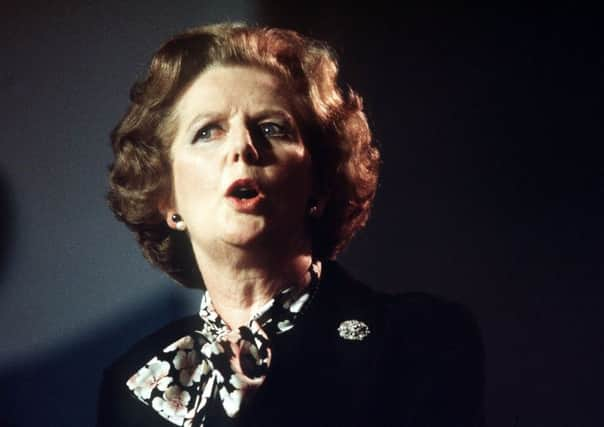Bernard Ingham: Five reasons why Margaret Thatcher's legacy is alive and well


In contrast, Thatcher was genetically programmed to prove conclusively that hard work is never fatal. Her brain was also consistently on overtime for up to 20 hours a day. No wonder she ended up cruelly afflicted by dementia.
Yet Reagan suffered grievously from it, too. I doubt whether the doctors can convincingly explain why both got it, given their different personas.
Advertisement
Hide AdAdvertisement
Hide AdI mention this conundrum because this weekend marks Thatcher’s death five years ago come Sunday.
Perhaps I can now reasonably examine her legacy, given that she left office 28 years ago.
I contend it is alive and well and fully vindicated by the experience of recent decades in five crucial respects: economics, the need for small government, trade union reform, defence and Europe.
Her “housewifely economics”, as the soothsayers trading as economists dismissed them, would never have allowed public finances to get into their current mess. The Tories have undoubtedly slashed Gordon Brown’s monumental deficit by two thirds but at £40-50bn it still inhibits good government.
Advertisement
Hide AdAdvertisement
Hide AdHer concept of limited government is more important than ever. Never forget Cecil Parkinson’s first law of government: its involvement always puts the price up for the taxpayer.
Thatcher maintained governments should be strong enough to do only what no one else can deliver: protection of the realm, the currency and the weak and the upholding of law and order.
Her reform of industrial relations has provided a basis for improved economic performance which is in the interests of the many, including trade unionists, and not just the few. The private sector is largely free of the union yoke. It is only in the public sector that the union barons feel relatively free to treat the public as pawns in their power game and, of course, as milch cows.
The public sector is effectively the last bastion of their abuse of power.
Advertisement
Hide AdAdvertisement
Hide AdDefence underlines the virtue of Thatcher’s doctrine. We must have an economy strong enough to secure the nation’s defences. Because of our economic tribulations over the last 10 years, stemming largely from Labour overspending and unbridled immigration, we remain strapped for defence cash. This is not healthy with Vladimir Putin mining and sapping the West.
Against this background, it is perhaps fortunate that her robust, not to say tactless, “diplomacy” is not putting President Donald Trump’s temper and vanity to the test. He is not a big, genial chap like Reagan.
Finally, Europe. Here her opponents can argue that she failed comprehensively. True, she solved the British budget problem, helped reform the Common Agriculture Policy (CAP) for a time, and signed the Single European Act to try to get a foothold in notably the German and French services sectors.
All this gave the EC, as it then was, the confidence to advance after years of stagnation. Unfortunately, it advanced in entirely the wrong direction: towards a federal Europe.
Advertisement
Hide AdAdvertisement
Hide AdBut here Thatcher pointed the way in three respects: her resistance to our ill-fated membership of the ERM until she ran out of political options; her opposition to a single currency and European central bank; and her dire warning in her Bruges speech in 1988 against ever closer union – i.e. the building of a federal United States of Europe.
Thatcher paved the way for the Brexit referendum. It is worrying that it took nearly 30 years for her message to strike home.
Her legacy leaves two other sobering thoughts.
First, the certainty that Jeremy Corbyn would comprehensively ditch every one of Thatcher’s tenets. The hard left, in its pursuit of the class war, has learned nothing since 1979.
Second, Theresa May suffers by comparison with Thatcher’s charisma, passion, forthrightness and apparent vigour. Some might say that she is haunted by our first woman Prime Minister.
Advertisement
Hide AdAdvertisement
Hide AdBut the reality is that she has shown guts, dedication and determination in governing Britain and notably in her pursuit of Brexit.
And if – as I expect – she brings home a reasonable Brexit settlement, she will have achieved more than Thatcher ever could in restoring the integrity of the UK as a sovereign state.
If she also follows my five crucial elements of Thatcher’s legacy, she will bear comparison with any predecessor. Reagan and Thatcher would then admire her from above.